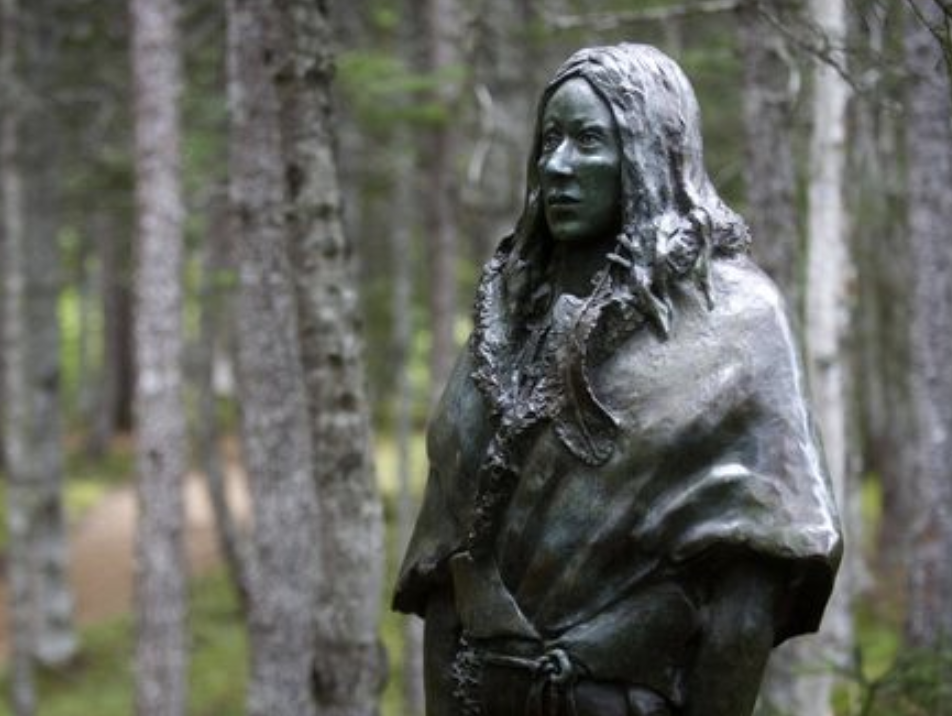
12 Apr Indigenous Peoples and Music at UVic
Gerry Squires made this sculpture in 2005 honouring Shanawdithit, widely believed to have been the last of the Beothuk. She died of tuberculosis on 6 June 1829 in St. John’s. I feel strongly that if you spoke to most Newfoundlanders who left high school in the mid 1990s, this fact would be the sum total of their experience with Indigenous people. That or a school trip to Halifax to see Mic Mac Mall. Indigenous people weren’t talked about in school or at home.
This past spring I taught MUS 391 Indigenous Peoples and Music at UVic and I would welcome the opportunity to do so again if asked. So why did I, a white, middle-class, first-generation Canadian from suburban Newfoundland teach this material? Because I asked to do so and I received support from my Director and my university walks the walk. Because the incredible Chancellor of UVic has used her voice to champion reconciliation longer than most of my students have been alive. Because forging connections and provoking conversation is of critical value beyond the content itself. Because I thought it would be an invigorating challenge, and if you aren’t challenged at work you’re in the wrong job. Because I know it’s just a first step and not the last time it will be taught. Because I’d like to teach it with many other people. Because it’s 2018.
A key guide on this journey has been Dr. Jeff Corntassel, who is Director of Indigenous Governance at UVic. My respect for Jeff is immense. I met Jeff through other friends socially, completely away from work. I think this is what has fused our friendship because Jeff isn’t a work friend. He’s a friend I have at work. This coming weekend, I join him in helping some up-and-coming Indigenous comedy enthusiasts work on their first set of stand-up at the Tsartlip Health Centre. He and I just really click and I am not embarrassed to appear vulnerable around him. On our first proper hang together, he told me all about his family, Stomping Ground, everything. I really do mean everything. His feelings on resurgence – those often unseen, unacknowledged actions that promote community health and well-being are covered in his new book. Frankly, I see it as required reading for anyone and will assign it in the future. Other books that have helped me include:
Reconcilation & The Way Forward
Reading cultivates quiet, stolen moments that neutralize the present and let the voice inside our head ask “what’s next?” The future is probably the least eternal thing. It’s about now. What can we do now that will challenge, provoke, and be uncomfortable? Hey, how about THESE?
I pursued graduate work in ethnomusicology because I knew music had the potential to answer questions I didn’t yet have. Performance alone wasn’t enough. I am interested in connecting with people far more than sound. Intense study of music from a wide variety of cultures prepared me for dealing with new people and opinions. Studying any art or people in a university setting necessitates an unending series of compromises. People avoid engaging the unknown because they are afraid of getting things wrong. So this course was a start. A good one.
These past few months, I was blessed with some very bright and open minded students in the class. I can’t even call it “my” class and in no way am I “their” teacher. Like Jeff, all I can do is guide. Create the situation. Set the table. Light the match. Their very willingness to engage the unknown within a brand new course was itself brave. They were consistently provocative, pressing, diligent, and quite honest. All I hoped was to create a welcoming space for potentially uncomfortable conversations to begin. You’d have to ask the students if that was successful, but in my own opinion we were working on resistance and transformative change through the study of music. So, if any students are reading this, thank you for helping each other.
Check out the great sounds we listened to. The whole she-bang. It’s a pretty killer playlist if I do say so myself. My sincere gratitude to Dr. Jarrett Martineau at CBC Reclaimed and Rosanna Deerchild at CBC Unreserved for their work in giving Indigenous artists the mic.
Also, way back in October 2017 we were honoured to host Tanya Tagaq and Christine Duncan in a series of workshops. Their openness at the beginning of the year started our journey on firm ground.
What’s next? I have no idea. If you want to either get a start or continue your journey, check out some of the links above. Let the tunes wash over you. Feel free to join us for this course the next time it is (hopefully) offered. Or take one like this or like this. This journey towards the frightening unknown only ends through willful ignorance. It’s an extremely long and difficult, maybe impossible, road ahead. Start now.






